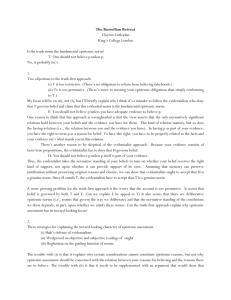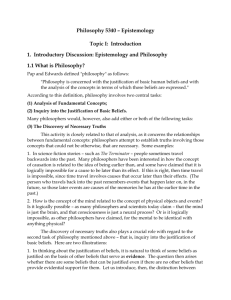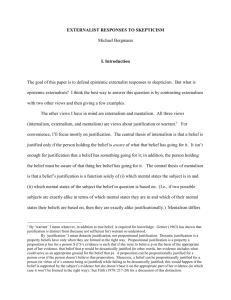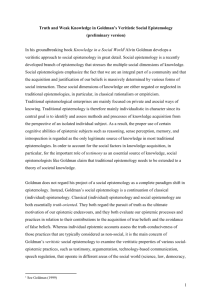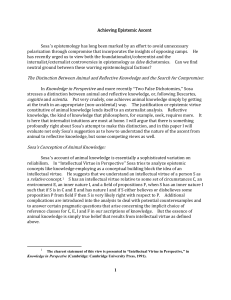Philosophy 440 – Theory of Knowledge Spring 2009, Wilburn Paper
advertisement
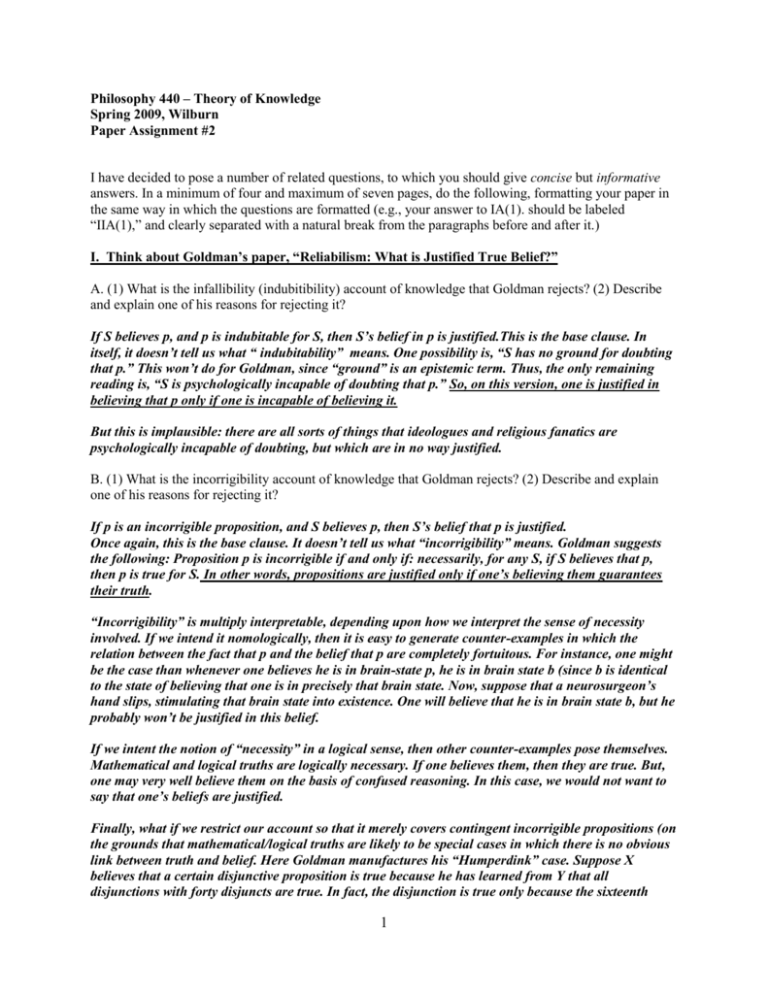
Philosophy 440 – Theory of Knowledge Spring 2009, Wilburn Paper Assignment #2 I have decided to pose a number of related questions, to which you should give concise but informative answers. In a minimum of four and maximum of seven pages, do the following, formatting your paper in the same way in which the questions are formatted (e.g., your answer to IA(1). should be labeled “IIA(1),” and clearly separated with a natural break from the paragraphs before and after it.) I. Think about Goldman’s paper, “Reliabilism: What is Justified True Belief?” A. (1) What is the infallibility (indubitibility) account of knowledge that Goldman rejects? (2) Describe and explain one of his reasons for rejecting it? If S believes p, and p is indubitable for S, then S’s belief in p is justified.This is the base clause. In itself, it doesn’t tell us what “ indubitability” means. One possibility is, “S has no ground for doubting that p.” This won’t do for Goldman, since “ground” is an epistemic term. Thus, the only remaining reading is, “S is psychologically incapable of doubting that p.” So, on this version, one is justified in believing that p only if one is incapable of believing it. But this is implausible: there are all sorts of things that ideologues and religious fanatics are psychologically incapable of doubting, but which are in no way justified. B. (1) What is the incorrigibility account of knowledge that Goldman rejects? (2) Describe and explain one of his reasons for rejecting it? If p is an incorrigible proposition, and S believes p, then S’s belief that p is justified. Once again, this is the base clause. It doesn’t tell us what “incorrigibility” means. Goldman suggests the following: Proposition p is incorrigible if and only if: necessarily, for any S, if S believes that p, then p is true for S. In other words, propositions are justified only if one’s believing them guarantees their truth. “Incorrigibility” is multiply interpretable, depending upon how we interpret the sense of necessity involved. If we intend it nomologically, then it is easy to generate counter-examples in which the relation between the fact that p and the belief that p are completely fortuitous. For instance, one might be the case than whenever one believes he is in brain-state p, he is in brain state b (since b is identical to the state of believing that one is in precisely that brain state. Now, suppose that a neurosurgeon’s hand slips, stimulating that brain state into existence. One will believe that he is in brain state b, but he probably won’t be justified in this belief. If we intent the notion of “necessity” in a logical sense, then other counter-examples pose themselves. Mathematical and logical truths are logically necessary. If one believes them, then they are true. But, one may very well believe them on the basis of confused reasoning. In this case, we would not want to say that one’s beliefs are justified. Finally, what if we restrict our account so that it merely covers contingent incorrigible propositions (on the grounds that mathematical/logical truths are likely to be special cases in which there is no obvious link between truth and belief. Here Goldman manufactures his “Humperdink” case. Suppose X believes that a certain disjunctive proposition is true because he has learned from Y that all disjunctions with forty disjuncts are true. In fact, the disjunction is true only because the sixteenth 1 disjunct is “I exist.” Here we have a proposition which is incorrigible (i.e., If one believes it, it is true). However, X is clearly not justified in believing it. (I know: this example makes my eyes glaze over too!) C. (1) What diagnosis does he offer of what goes wrong with these and all other traditional internalistic accounts? (2) Describe and explain the alternative approach that he proposes. (For this purpose, you can deal with the preliminary version (#7) of Goldman’s account of justification presented on p. 169.) (1) Goldman thinks that the problem with all such internalistic accounts is that they endeavor to ascribe “justificational” status on beliefs without regard to the question of what causally initiates and sustains the beliefs in question. Most of the counter-examples in the literature arise precisely because the beliefs are caused in some bizarre or non-standard way. (2) The alternative approach that Goldman proposes is his reliabilist account, on which S is justified in his belief that p only if this belief is ultimately caused in the right way (i.e., generally, by the fact that p itself). Formulation #7 (on p. 169) encapsulates this idea, but ultimately fails because it includes an epistemic term in the base clause. II. Think about Conee and Feldman’s paper “Evidentialism” A. In no more than two pages, describe the central objection to externalist reliabilism that these two authors articulate in Section V of their paper. In the course of this, cite two alleged counter-examples to externalist reliabilism, including an original one of your own (you might consider modeling it on the Truetemp case we discussed in class). Their central objection can be stated in the form of principle EJ: one’s belief that p is justified only when one’s belief fits the evidence. They take this principle to identify the basic concept of epistemic justification.One’s beliefs are justified by evidence, not by reliable belief-forming processes. Additionally, they think that the doctrine of reliabilism is itself essentially unclear. What beliefs it counts as justified depends upon how it characterizes the pertinent belief-forming processes (e.g., is a process reliable by virtue of having produced largely true beliefs up till now, or is one concerned with future long-run reliability instead.) But their main objection, again, takes the form of principle EJ. Perhaps beliefs that are brought about by reliable belief-forming processes deserve some term of epistemic commendation, but “reliable” is not it. In effect, they think that the externalist is simply changing the subject from reliability to something else. To make their point, Conee and Feldman invoke their own clairvoyant example (e.g., a clairvoyant’s beliefs about distant events are caused by reliable belief-forming processes of which he is unaware. Is his justified? They say “no.” B. Do you agree with C and F’s objection (described above) or not? Explain and justify your answer. As suggested in class, the question you probably want to ask yourself here is the following: do you take the externalist to simply be changing the subject? III. Consider Bonjour’s papers “Can Empirical Knowledge Have a Foundation?” 2 A. Consulting the first of these papers, describe the epistemic regress problem and the four traditional strategies for dealing with it. The epistemic regress problem is the following: unless we can provide some kind of privileged grounding for our beliefs, it seems to be the case that our process of justification never gets off the ground. Traditional Strategies: 1. Foundationalism (show that there is a ground of epistemically privileged beliefs). 2. Arbitrary foundation (accept as a fact of life that our justifications just stop with a set of beliefs which is, in no way, epistemically privileged). 3. Coherentism (show that our chain of justifications circle back on themselves, but in a special “coherent’ fashion. 4. Infinitism (accept as a fact of life that our chain of justication just retreats back forever). B. Describe why Bonjour takes foundationlism to be an unacceptable resolution of the epistemic regress problem. His argument occurs primarily on p. 225 through the first non-full paragraph on p. 228. The problem is essentially this: The foundationalist typically takes his basic beliefs to concern immediately apprehended states of affairs (concerning the sensory given). In this, he is a “givinist.” For the givenist, then, first-order beliefs are beliefs about first-person experience. This means that three items are necessary for the foundationalist to get off the ground, the belief, the state of affairs which is the object of the belief, and the immediate apprehension of that state of affairs which makes the belief possible. But now the question arrises: what is the status of this state of immediate apprehension? If it is experience-like (non-cognitive), then it has no propositional content, and hence can’t justify the first-order belief. But if it is belieflike, then it expresses a propositional content which itself stands in need of justification. In neither case does it do all of the work required of it. C. In this connection, describe and explain the main criticism that Bonjour offers of the notion of “confrontation” insofar as this notion is supposed to help the foundationalist. The notion of “confrontation” is typically used to explain how this state of immediate apprehension works. On this account, the mind directly confronts reality. One’s experiences are directly present to consciousness and consciousness reads their character off them without mediation, and thus without the possibility of error. Bonjour simply rejects this view as a Cartesian cartoon, too simple to explain much of anything. D. Do you agree with this criticism? Describe and justify your answer. You don’t have to solve the problem here. But, as this is the most central recurrent issue in the history of epistemological debate, get clear on what you think about it. 3







